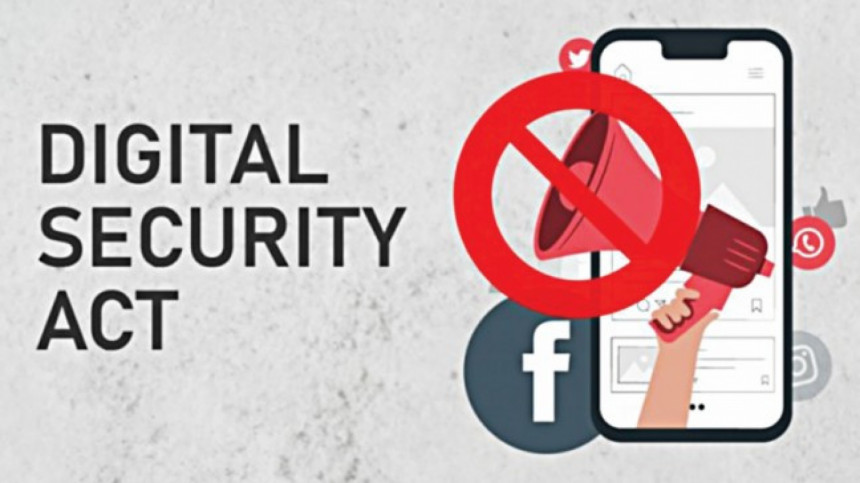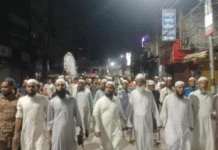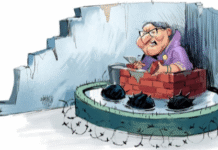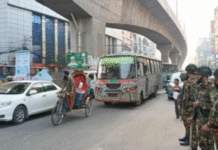
On one hand, there were at least 22 incidents of Hindu religious sites being attacked this year.
On the other, there were at least seven incidents in which members of the minority community were sued or arrested under the Digital Security Act or other laws for “hurting religious sentiments”.
While both are examples of “hurt sentiments”, the legal actions taken were vastly different.
Incarcerated Pritom Das’s home in Srimangal is sombre during this year’s Durga Puja celebrations.
Pritom, a mobiliser of an organisation named “Rashtra Sanskar Andolon”, was arrested a month ago under the DSA. He has since been rejected bail and is now spending Puja in jail.
His favourite delicacy during this time of the year was his mother’s special mutton curry. His brother Piyas Das said no one in their home is in the mood to get into lengthy culinary preparations.
“After all, there is no celebration in jail.”
Pritom’s alleged crime was posting a quote by the Urdu writer Saadat Hasan Manto, where someone asked the writer what the situation of the country was and he responded, “Just like the Friday prayers in jail …”.
This literary reference was lost on the plaintiff — 24-year-old Chhatra League activist Mahbub Alam Bhuiyan — who took one look at Das’s surname and concluded that his religious sentiments were decidedly hurt.
While Pritom languishes in jail, artisan Bhaskar Ranjan Pal of Satkhira’s Agardari village still does not know who vandalised his workshop and destroyed as many as 53 idols in the making.
The incident happened in the middle of the night on January 24 this year. The photos of the attack show idols under construction with heads and arms askew after being battered with blunt objects.
Bhaskar said he closed his shop at 9:00pm and went home. He found his workshop vandalised when he went back the next morning.
“I am an over-60-year-old poor artisan, working for 35 years. I don’t have any enemies. I don’t know who did this and why. Nothing like this has ever happened before.”
He estimated his losses at Tk 42,000.
Even though a case was filed, nobody was ever apprehended because none of the criminals could be identified, said Swapan Kumar Shil, who leads Satkhira’s Puja Udjapan Parishad.
Two more temples — a Swaraswati temple in Habiganj and the Shri Shri Shitla O Tara Ma temple in Narayanganj — were vandalised the very next month.
Then in March, three more temples came under attack in Dhaka and Chattogram’s Banshkhali, followed by a temple in Noakhali being vandalised in April.
In July, there were as many as six attacks on religious sites.
These include a Ram Krishna temple in Gaibandha’s Damodarpur, the Bhushondi Rathkhola temple in Tangail, temples in Dighalia of Narail, Shibaloy of Manikganj and Rangunia of Chattogram.
In addition, devotees praying inside the Shri Shri Jalakumari temple in Chattogram’s Chandraghona were also attacked.
In August, household temples in Kurigram’s Nagdanga, Barguna’s Shibganj and Satkhira’s Shibpur were vandalised.
In September – the month leading up to the Puja celebrations — four incidents of vandalism and looting took place in temples across Dhaka’s Nababganj, Magura’s Dariapur, Kushtia’s Lahini Karmakar Para and Barishal’s Chanpur.
This is according to data collected by Bangladesh Puja Udjapan Parishad, which maintains that nobody has been arrested in these cases, nor has there been a conviction.
On the other hand, school teachers Hridoy Mondal of Munshiganj and Swapan Kumar Biswas of Narail were arrested in April and June respectively for “hurting religious sentiments”, with the former serving jail time, and the latter publicly made to wear a garland of shoes.
Only Swapan got some form of a legal remedy, with action being taken against those who publicly humiliated him.
Hridoy’s only consolation was being granted bail and release from prison.
In addition, a Hindu house in Bagerhat’s Morrelganj upazila was vandalised over a rumoured Facebook post made by 20-year-old Kaushik Biswas, who was arrested for “hurting religious sentiments” in April.
A carnage in Narail’s Dighalia’s Sahapara left several Hindu houses burnt to embers and shops vandalised, all because a teenage boy allegedly uploaded a Facebook status.
Both the boy and his father were detained and the former was taken on a three-day-remand under the DSA.
In August, Jhumon Das was arrested in Sunamganj’s Shalla, in a second DSA case, with his first being when he was arrested for posting against fallen Hefazat leader Mamunul Haque.
This time too he was booked for a Facebook status that allegedly threatened religious incitement.
The Puja Udjapan Parishad reported another case in Satkhira in September, in which a man named Mihir Mondal himself allegedly sought police custody after a Facebook post by him “incited” the community of Ashashuni village.
One of the directives given by the Parishad prior to the celebrations this year include “refraining from activities that hurt the religious sentiments of others.”
As Pritom’s brother Piyas told The Daily Star, “As the minority here, we have to be careful about what we say.”
The Parishad has maintained that attacks on temples are meant to hurt religious sentiments of the Hindu community.
In a statement on September 24, it said, “Using fabricated allegations of hurting religious sentiments, radical forces have been attacking, vandalising, looting and setting fire to temples and Hindu homes.”
Advocate Zahirul Islam Khan Panna, human rights expert, pointed out that even the violent attacks that took place during last year’s Puja celebrations have not yet seen the light of justice.
“There was supposed to be a judicial enquiry, but it never took place because the Appellate Division stayed it recently due to an ongoing departmental enquiry.”
On the flipside, the DSA cases filed against Pritom and the others are discriminatory and exploitative, he said.
Panna, who has represented many accused under the DSA, stated, “These cases are targeted. If you are a religious minority, if you are vulnerable, you are more likely to be a victim of the DSA. Has there been any cases filed concerning hate speech against minorities, which we see all over social media?
“In the case of Jhumon Das, I read out his social media [post] in an open court and said that if I posted it, it would be considered patriotic. But since Jhumon said it, he was sued and arrested.
“There were six cases filed concerning the 2016 [religious] violence in Nasirnagar. In one of those cases, a poor fisherman, Rasraj, was sued for hurting religious sentiments. He cannot even operate social media but his case is actively at the trial stage, with Rasraj being charge-sheeted. Meanwhile, the other cases have gone nowhere.”
In other instances of violence against religious minorities, a notable one was the 2012 Ramu violence, in which local mobs carried out a series of attacks on Buddhist monasteries, shrines, and houses in Cox’s Bazar’s Ramu upazila. This 10-year-old attack has yet to see the light of justice.











